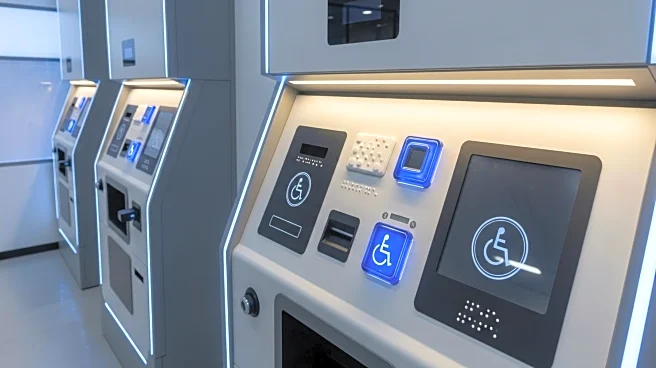What is the story about?
What's Happening?
Tesco has launched new accessibility modes on its self-service checkouts to assist visually impaired customers in its UK and ROI stores. This initiative is part of a broader focus on inclusive retail practices, which will be highlighted at the upcoming 2025 RTIH Innovation Awards. The awards aim to celebrate global tech innovation in the retail sector, emphasizing advancements such as checkout-free stores, automated supply chains, and immersive customer experiences. Tesco's move aligns with its ongoing development of AI capabilities across its operations, including optimizing delivery routes to enhance efficiency.
Why It's Important?
The introduction of accessibility modes by Tesco represents a significant step towards inclusive retail, ensuring that visually impaired customers can navigate self-service checkouts with greater ease. This development not only enhances customer experience but also sets a precedent for other retailers to follow suit in adopting technology that caters to diverse customer needs. By improving accessibility, Tesco is likely to strengthen customer loyalty and expand its consumer base. Additionally, the focus on AI and automation in retail operations could lead to increased efficiency and profitability, benefiting the industry as a whole.
What's Next?
The 2025 RTIH Innovation Awards will further explore advancements in retail technology, including Tesco's accessibility initiatives. As the awards celebrate tech innovation, other retailers may be inspired to implement similar inclusive technologies. The event will also showcase developments in automated supply chains and immersive experiences, potentially influencing future retail strategies. Stakeholders in the retail industry, including technology providers and consumer advocacy groups, may engage in discussions on the importance of accessibility and innovation in enhancing customer satisfaction and operational efficiency.
Beyond the Headlines
Tesco's focus on accessibility highlights the ethical dimension of retail technology, emphasizing the need for inclusivity in customer service. This move could prompt discussions on the legal obligations of retailers to accommodate customers with disabilities, potentially leading to regulatory changes. Furthermore, the integration of AI in optimizing delivery routes reflects a long-term shift towards sustainable practices, reducing carbon footprints by minimizing unnecessary travel. As retailers increasingly adopt AI and automation, the industry may witness a transformation in operational models, prioritizing efficiency and sustainability.















